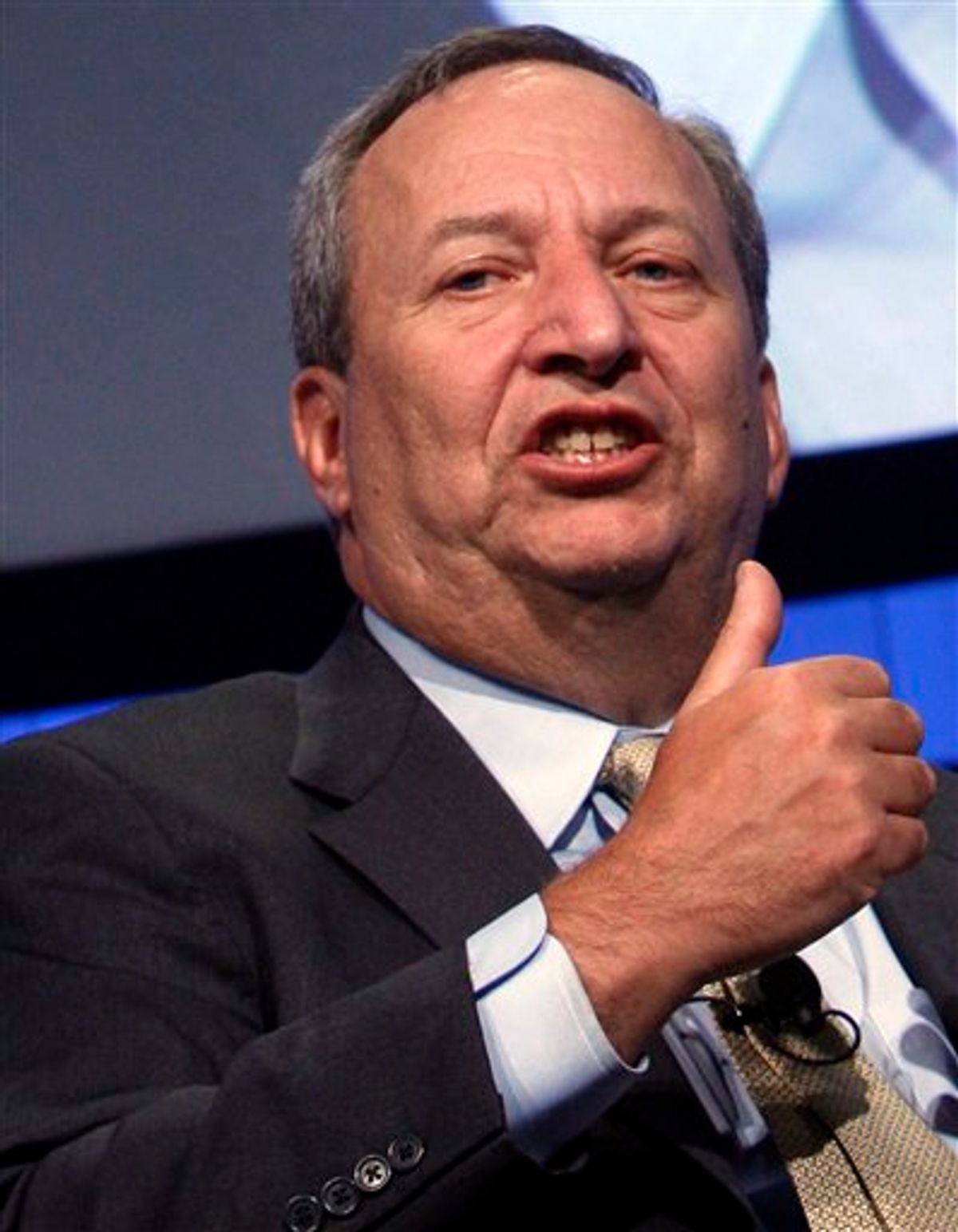Who knew April would see a bull market in Larry Summers kremlinology bust out? The future career plans of the director of the National Economic Council have been the talk of the blogosphere all week -- or, at least, that portion of the blogosphere that finds endless speculation about potential Obama administration staffing changes irresistible.
Maybe it's because Congress is out of session and it is exceedingly difficult to find new and interesting things to say about financial reform that will sate the hunger of the blog-reading masses. Or maybe "Larry Summers" is just a potent keyword for search engine-optimized content delivery. But everyone's got a theory:
Fox Business News' Charlie Gasparino kicked off the gossip on March 26 when he reported that Summers "has been telling associates that he may be looking to leave the administration." Why? Because, according to some unnamed Wall Street executives, he is "unhappy" in his job. The Atlantic's Marc Ambinder followed up on Tuesday with the news that "the big rumor was that Rahm Emanuel himself was making a secret list of people who might be potential replacements for Summers," but concluded that he wasn't about to leave, because he's got a lot of stuff on his plate, like riding "herd over the administration's huge infrastructure renewal program."
Ambinder's colleague, Josh Green, promptly offered a rebuttal, declaring that, yes, Summers is leaving, in part because he "is frustrated by his role, and his colleagues are clearly frustrated with him." His ego can't handle the fact that he isn't the Treasury secretary or the chairman of the Federal Reserve. And he was denied his own personal car and driver! But the real problem, says Green, is his lack of power.
For meta-level who-replaces-whom-musical-chairs speculation launched from the above ur-texts, interested readers can check into the back and forth between Bruce Bartlett and Stan Collender at Capital Gains and Games. There's also an entire sub-narrative focusing on the political implications of the timing and nature of his departure. What if Summers left the White House before the midterm elections and took a job with Goldman Sachs? Revolving-door-apocalypse!
(My bet is that a wrathful Obama would cause the earth to crack wide open and suck Summers straight down into the fiery depths of hell, should that happen, so I'm kind of rooting for it. But I also worry about all the brain aneurysms such a scenario would inflict on Summers' legions of progressive critics.)
Unlike Ambinder or Green or Ezra Klein, I haven't spent years cultivating the kind of Washington sources who love nothing more than making anonymous comments about who is feeling especially grumpy in the White House on a minute-by-minute basis, so I cannot offer any informed analysis as to how long we're going to have Larry Summers to kick around. But I do have an observation: Larry Summers just isn't that big a deal.
Will the markets shudder if he leaves the administration? No. Is he crucial to the passage of financial reform? No. Is he the critical voice in determining the Obama agenda? Apparently not, or he wouldn't be feeling so underappreciated. If it is true that Summers is dropping hints about leaving, then my takeaway is that he is not particularly crucial to White House economic policy making.
Whether that means that Tim Geithner has proved triumphant in the game of bureaucratic power plays or that Office of Management and Budget director Peter Orszag and Council of Economic Advisers chair Christina Romer are amply capable all by themselves of telling Obama what he needs to hear, I don't know. What I do know is that for a very long time, Summers has been showered with absurd amounts of attention by the press, by his enemies on the left, by Wall Street, all predicated on the assumption he was the Svengali pulling all the economic policy strings in Washington.
But that doesn't seem to be true, or you'd think he'd want to stay around. Repeat after me: Larry Summers is no big deal.



Shares